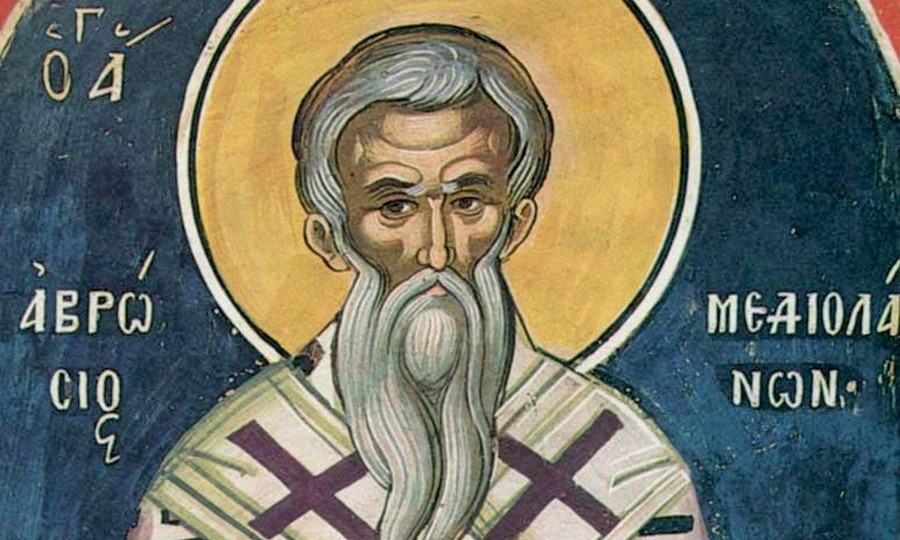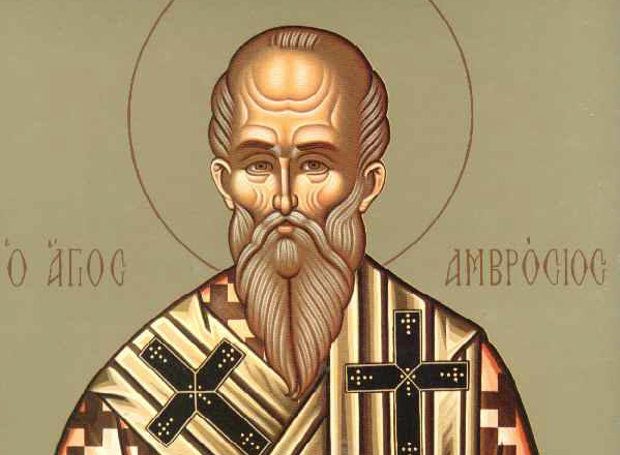Saint Ambrose, Bishop of Milan (7 December)


Saint Ambrose, Bishop of Milan, was born in the year 340 into the family of the Roman prefect of Gaul (now France). Even in the saint’s childhood there appeared presentiments of his great future. Once, bees covered the face of the sleeping infant. They flew in and out of his mouth, leaving honey on his tongue. Soon they flew away so high that they could no longer be seen. Ambrose’s father said that the child would become something great when he reached manhood.
After the death of the father of the family, Ambrose journeyed to Rome, where the future saint and his brother Satyrius received an excellent education. About the year 370, upon completion of his course of study, Ambrose was appointed to the position of governor (consular prefect) of the districts of Liguria and Aemilia, though he continued to live at Mediolanum (now Milan).
In the year 374 Auxentius, the Arian Bishop of Mediolanum, died. This led to complications between the Orthodox and the Arians, since each side wanted to have its own bishop. Ambrose, as the chief city official, went to the church to resolve the dispute.
While he was speaking to the crowd, suddenly a child cried out, “Ambrose for bishop!” The people took up this chant. Ambrose, who at this time was still a catechumen, considered himself unworthy, and tried to refuse. He disparaged himself, and even tried to flee from Mediolanum. The matter went ultimately before the emperor Valentinian the Elder (364-375), whose orders Ambrose dared not disobey. He accepted holy Baptism from an Orthodox priest and, passing through all the ranks of the Church clergy in just seven days, on December 7, 374 he was consecrated Bishop of Mediolanum. He dispersed all his possessions, money and property for the adornment of churches, the upkeep of orphans and the poor, and he devoted himself to a strict ascetic life.
Ambrose combined strict temperance, intense vigilance and work within the fulfilling of his duties as archpastor. Saint Ambrose, defending the unity of the Church, energetically opposed the spread of heresy. Thus, in the year 379 he traveled off to establish an Orthodox bishop at Sirmium, and in 385-386 he refused to hand over the basilica of Mediolanum to the Arians.
The preaching of Saint Ambrose in defense of Orthodoxy was deeply influential. Another noted Father of the Western Church, Saint Augustine (June 15), bore witness to this, having accepted holy Baptism in the year 387 by the grace of the preaching of the bishop of Mediolanum.
Saint Ambrose also actively participated in civil matters. Thus, the emperor Gracian (375-383), having received from him the “Exposition of the Orthodox Faith” (De Fide), removed, by decree of the saint, the altar of Victory from the halls of the Senate at Rome, on which oaths were wont to be taken. Displaying a pastoral boldness, Saint Ambrose placed a severe penance on the emperor Theodosius I (379-395) for the massacre of innocent inhabitants of Thessalonica. For him there was no difference between emperor and commoner. Though he released Theodosius from the penance, the saint would not permit the emperor to commune at the altar, but compelled him to do public penance.
The fame of Bishop Ambrose and his actions attracted to him many followers from other lands. From far away Persia learned men came to him to ask him questions and absorb his wisdom. Fritigelda (Frigitil), queen of the military Germanic tribe of the Markomanni, which often had attacked Mediolanum, asked the saint to instruct her in the Christian Faith. The saint in his letter to her persuasively stated the dogmas of the Church. And having become a believer, the queen converted her own husband to Christianity and persuaded him to conclude a treaty of peace with the Roman Empire.
The saint combined strictness with an uncommon kindliness. Granted a gift of wonderworking, he healed many from sickness. One time at Florence, while staying at the house of Decentus, he resurrected a dead boy.
The repose of Saint Ambrose, who departed to the Lord on the night of Holy Pascha, was accompanied by many miracles. He even appeared in a vision to the children being baptized that night. The saint was buried in the Ambrosian basilica in Mediolanum, beneath the altar, between the Martyrs Protasius and Gervasius (October 14).
A zealous preacher and valiant defender of the Christian Faith, Saint Ambrose received particular renown as a Church writer. In dogmatic compositions he set forth the Orthodox teaching about the Holy Trinity, the Sacraments, and Repentance: “Five Books on the Faith” (De Fide); “Explication of the Symbol of the Faith” (Explanatio Symboli); “On the Incarnation” (De Incarnationis); “Three Books on the Holy Spirit” (De Spiritu Sancto); “On the Sacraments” (De Sacramento); “Two Books on Repentance” (De Paenitentia). In writings about Christian morality, he explained the excellence of Christian moral teaching compared to pagan moral teaching.


A well-known work of Saint Ambrose, “On the Duties of the Clergy” (De Officiis Ministrorum) evidences his deep awareness of pastoral duty. He stresses that those who serve in the Church should have not only the proper knowledge of Church services, but also the proper knowledge of moral precepts.
Saint Ambrose was also a reformer of Church singing. He introduced antiphonal singing (along the Eastern or Syrian form) into the Western Church, which became known as “Ambrosian Chant.” He also composed twelve hymns which were used during his lifetime. The hymn, “Thee, O God, we praise” (Te Deum), attributed to Saint Ambrose, entered into the divine services of the Orthodox Church (Molieben).
This Saint was born in Gaul in 340, and was a member of the Roman Senate. After the death of Auxentius, the Arian Bishop of Milan, a violent dispute arose among the Orthodox and Arians about who would succeed him. Ambrose, desiring as Governor of the province to restore the peace, attempted to mediate between them. As he spoke to the people, eloquently persuading them to elect a new bishop without tumult and disorder, a young child, inspired from on high, suddenly cried out “Ambrose, bishop!” To his astonishment and dismay, the people immediately took up this cry themselves, and over his many protests, he was raised to the episcopal throne of Milan on December 7, 374. A great Father of the Church, he wrote many works in Latin, and was both an unwearying opponent of Arianism, and a fearless accuser of emperors when they transgressed the law of God. Having lived fifty-seven years, he reposed on April 4, on the eve of Pascha, in the year 397.
This great holy father of the Orthodox Church was of eminent birth. His father was the imperial deputy of Gaul and Spain and was a pagan by faith, but his mother was a Christian. While he was still in the cradle, a swarm of bees settled on him, poured honey onto his lips, and flew away. And while still a child, he extended his hand and spoke prophetically: “Kiss it, for I will be a bishop.” After his father’s death, the emperor appointed him as his representative in the province of Liguria, of which Milan was the chief city. When the bishop of Milan died, a great dispute arose between the Orthodox Christians and the Arian heretics concerning the election of a new bishop. Ambrose entered the church to maintain order, this being his duty. At that moment, a child at its mother’s bosom exclaimed: “Ambrose for bishop!”
All the people took this as the voice of God, and unanimously elected Ambrose as their bishop, contrary to his will. Ambrose was baptized, passed through all the necessary ranks and was consecrated to the episcopacy, all within a week. As bishop, Ambrose strengthened the Orthodox Faith, suppressed the heretics, adorned churches, spread the Faith among the pagans, wrote many instructive books, and served as an example of a true Christian and a true Christian shepherd. He composed the famous hymn “We Praise Thee, O God.” This glorious hierarch, whom men visited from distant lands for his wisdom and sweetness of words, was very restrained, diligent and vigilant. He slept very little, labored and prayed constantly, and fasted every day except Saturday and Sunday. Therefore, God allowed him to witness many of His miracles and to perform miracles himself. He discovered the relics of the Holy Martyrs Protasius, Gervasius, Nazarius and Celsus (October 14).
Meek toward lesser men, he was fearless before the great. He reproached Empress Justina as a heretic, cursed Maximus the tyrant and murderer, and forbade Emperor Theodosius to enter a church until he had repented of his sin. He also refused to meet with Eugenius, the tyrannical and self-styled emperor. God granted this man, so pleasing to Him, such grace that he even raised the dead, drove out demons from men, healed the sick of every infirmity, and foresaw the future. Ambrose died peacefully on the morning of Pascha in the year 397 A.D.
Kontakion of Ambrose, Bp. Of Milan
Third Tone
Flashing lightning-like with godly doctrines, thou, O Ambrose, dravest off the darkness of the impious error of Arius; and working wonders and signs by the Spirit’s might, thou, O good shepherd, didst heal divers sufferings. Righteous Father, thou initiate of sacred mysteries, entreat Christ God to grant great mercy unto us.
Source: oca.org / goarch.org / westserbdio.org




